Aerospace in Southern California
December 13, 2016
The Huntington
The history of the aerospace industry in Southern California and its intersections with contemporary culture are the focus of this panel discussion, presented in conjunction with the exhibition of NASA’s Orbit Pavilion. Peter Westwick, aerospace historian, and Daniel Lewis, senior curator of the history of science and technology at The Huntington, join ICW Director William Deverell.
-
Peter Westwick is a research professor in history at USC and director of ICW’s Aerospace History Project. He received his BA in physics and PhD in history from Berkeley. He is the author of Into the Black: JPL and the American Space Program, 1976-2004, which won book prizes from the American Institute of Aeronautics and Astronautics and the American Astronautical Society, and The National Labs: Science in an American System, 1947-1974, which won the book prize of the Forum for the History of Science in America. He is also editor of Blue Sky Metropolis: The Aerospace Century in Southern California, which was selected to Best Non-Fiction of 2012 by the LA Public Library, and co-author, with Peter Neushul, of The World in the Curl: An Unconventional History of Surfing, an LA Times bestseller. His most recent book is Stealth: The Secret Contest to Invent Invisible Aircraft. He is now working on a history of science and technology in California since the Gold Rush. In addition to overseeing archival acquisitions and oral histories for the Aerospace History Project, he contributes to ICW’s The West on Fire project.
-
Dr. Daniel Lewis is responsible for The Huntington’s history of science and technology holdings from 1800 to the present. He holds the Ph.D. in Latin American history from the University of California at Riverside and has had post-doctoral appointments at Oxford University, the Smithsonian, and the Rachel Carson Center for Environment and Society in Munich. Lewis’s primary research interests lie in environmental history. Lewis is the author of three books: Iron Horse Imperialism: The Southern Pacific of Mexico, 1880-1951 (2007); The Feathery Tribe: Robert Ridgway and the Modern Study of Birds (2012); and Belonging on an Island: Birds, Extinction and Evolution in Hawai’i (2018).
“Recreating the Aloha Spirit: Japanese Americans from Hawai’i and the Postwar American Dream”
ICW In Conversation with Anne Soon Choi
November 3, 2016
Melanie’s Classroom, EVC, The Huntington
Anne Soon Choi joins ICW Director William Deverell to discuss her book project “Recreating the Aloha Spirit: Japanese Americans from Hawai’i and the Postwar American Dream”.
-
Anne Soon Choi is an Associate Professor in the Department of Interdisciplinary Studies at California State University Dominguez Hills (CSUDH). She is trained as a historian and a gerontologist and is a specialist in immigration history and community-based care for older adults. Before her appointment at CSUDH, Choi was on the faculty at the University of Kansas. She has also held postdoctoral fellowships at Swarthmore College and UCLA. She earned her Ph.D. in History from the University of Southern California and her MPH and MSW from the University of California, Los Angeles. Her work has appeared in Amerasia, American Studies, Acta Koreana, and Health and Social Care in the Community. Her book project “Recreating the Aloha Spirit: Japanese Americans from Hawai’i and Postwar Suburbanization in Southern California” is under contract with University of Hawai’i Press.
Science Fiction Los Angeles: Words and World Building in the City of Angels (Day 2)
October 29, 2016
USC Doheny Memorial Library, 2nd Floor
Science fiction is part of the cultural heritage of Los Angeles. From the Los Angeles Science Fiction Society, whose members, including Ray Bradbury and Robert Heinlein, began meeting at Clifton’s Cafeteria in the 1930s, to the dystopian visions of the film Blade Runner, based on Philip K. Dick’s novel Do Androids Dream of Electric Sheep?, Southern California’s particular blend of high and pop culture has made the place an incubator of the form.
On day two of the conference, ICW hosted a series of panels and discussions with writers and thinkers on the implications of Los Angeles’s science fiction heritage. Featured authors include Steve Erickson, Mark Frauenfelder, Margaret Wappler, and M.G. Lord, and panels will cover such themes as Artificial Intelligence and visions of the future, the sustained influence of the late Octavia Butler, and the ways in which Ray Bradbury’s life in Los Angeles influenced his writing.
Science Fiction L.A. is brought to you by the Huntington-USC Institute on California and the West, USC Dornsife College, and the USC Sidney Harmon Academy for Polymathic Study.
_________________________________________________________________________
Science Fiction Los Angeles: Words and World Building in the City of Angels (Day 1)
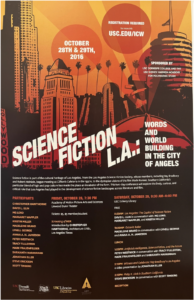
October 28, 2016
Academy of Motion Picture Arts and Sciences
Science fiction is part of the cultural heritage of Los Angeles. From the Los Angeles Science Fiction Society, whose members, including Ray Bradbury and Robert Heinlein, began meeting at Clifton’s Cafeteria in the 1930s, to the dystopian visions of the film Blade Runner, based on Philip K. Dick’s novel Do Androids Dream of Electric Sheep?, Southern California’s particular blend of high and pop culture has made the place an incubator of the form.
The conference began with a Friday night screening of the film HER at the Academy of Motion Picture Arts and Sciences Linwood Dunn Theater in Hollywood and a conversation with Christopher Hawthorne on the architectural settings and moods of L.A. science fiction films.
Science Fiction L.A. is brought to you by the Huntington-USC Institute on California and the West, USC Dornsife College, and the USC Sidney Harmon Academy for Polymathic Study.
_________________________________________________________________________
Xenogenesis Suite: A Musical Tribute to Octavia E. Butler
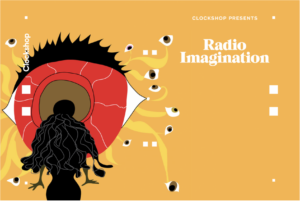
October 27, 2016
Rothenberg Hall, The Huntington
Xenogenesis Suite, composed by Nicole Mitchell, highlights a journey into otherworldly experiences inspired by the award winning science fiction author and Afro-Futurist, Octavia E. Butler.
In Butler’s Dawn, the extra-terrestrial “Oankali rescue the earth from the destruction of nuclear war” and the surviving humans meet their fate to live among intelligent, benevolent, yet paternalistic aliens. Through music, flutist composer Nicole Mitchell evokes an emotional journey into the horrific, yet fascinating unknown — a journey through the process of fear. At The Huntington, Mitchell’s performance will feature compositions from her Octavia E. Butler projects — Xenogenesis Suite (Firehouse 12, New Haven) with some visitation of Intergalactic Beings (FPE, Chicago). The event will premiere Mitchell’s Chicago-based group, Black Earth Ensemble for a rare Los Angeles appearance, merging old friends with new musician friends from Southern California. The performance was followed by a Q&A with Mitchell and a reception in the courtyard.
-
Nicole Mitchell is a creative flutist, composer and educator. Her artistic mission is to “celebrate the power of endless possibility by creating visionary worlds through music that bridge the familiar and the unknown, with hopes of catalyzing healing and transformation.” The recipient of several awards including the Doris Duke Artist Award, the Herb Alpert Award, Chicagoan of the Year, and the 3Arts Award, Mitchell has been highlighted at festivals and art venues throughout Europe, the U.S. and Canada. Having spent over two decades in Chicago music, Mitchell is a former president of Chicago’s Association for the Advancement of Creative Musicians (AACM). She the founder of critically acclaimed Black Earth Ensemble and has been repeatedly named by DownBeat Critics Poll and the Jazz Journalists Association as “Top Flutist of the Year” from 2010-2015. Now based in California, Mitchell is a Professor of Music, teaching in the “Integrated Composition, Improvisation and Technology,” (ICIT), a PhD program at the UC Irvine.
-
Nicole Mitchell’s Black Earth Ensemble includes:
Chicago:
David Boykin (tenor sax, bass clarinet)
Mankwe Ndosi (vocals)
Tomeka Reid (cello)
Avreeayl Ra (percussion)Southern California:
Anthony Davis (piano)
Ras G (electronics)
Nicole Mitchell (flutes, composition)
Eric Revis (bass)
Stephanie Richards (trumpet)
Science and the Humanities: A Meeting of Minds

October 16, 2016
Rancho Los Alamitos
The intersection of science, technology and the humanities is the meeting of creative, collaborative thinking and the “continuum of possibility” from diverse perspectives. In imagining something different, science and the humanities explore and verify conditions and aspirations that will lead to home.
-
Lori Bettison-Varga is the President and Director of the Natural History Museum of Los Angeles County. She embraces science advocacy and education in the region and the world. “Science is dynamic, progressive, and builds upon itself,” she says. “What we know has evolved, and that makes us appreciate the responsibility we have to our natural world.”
-
Michael H. Dickinsen is Zarem Professor of Biology and Bioengineering at the California Institute of Technology and head of the Dickinson Lab. “Understanding how brains combine information from different senses to make appropriate decisions,” he says, “is one of the central challenges in neuroscience.” He is a member of the National Academy of Arts and Sciences and a past recipient of the MacArthur Fellowship.
-
William Deverell is the Chairman of the History Department at USC and Director of the Huntington-USC Institute on California and the West. His books define the political, social and environmental history of the 19th and 20th century American West. His latest co-authored book is Water and Los Angeles: A Tale of Three Rivers (UC Press, October 2016).
-
Ursula K. Heise is Marcia H. Howard Professor in the Department of English and the Institute of the Environment & Sustainability at UCLA. Her work focuses on contemporary literature, environmental culture, science, globalization and media theory. She also is editor of the journal, Literatures, Culture, and the Environment.
-
Hannah Landecker is the Director of The UCLA Institute for Society and Genetics which considers the ethical, legal, and societal implications of the biological sciences and genetics. Her work has focused on the social and historical study of biotechnology and biomedicine.
-
D. J. Waldie is author, essayist, and commentator. He is a life-long resident of Lakewood and its former Deputy City Manager. He also is a commentator for KCET and a contributing editor of the Los Angeles Times.
Coming to Terms with Los Angeles
USC Alumni Event: A Conversation with writer David L. Ulin
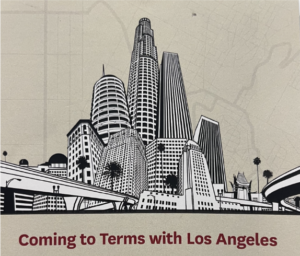
August 28, 2016
Haaga Hall, The Huntington
USC Dornsife and Huntington-USC Institute on California & the West invite you to spend the day with fellow Trojans at The Huntington Library, Art Collections and Botanical Gardens. The day will kick off with a champagne brunch followed by a conversation with USC History Professor William Deverell and writer David L. Ulin, one of our regions most astute observers of Los Angeles. The conversation will address Ulin’s new book, Sidewalking, as well as the different ways in which his writing, teachings, and projects express a desire, even an obligation, to come to terms with his adopted city.
-
William F. Deverell received his undergraduate degree from Stanford University in American Studies with honors and distinction. He received his Ph.D. in American History from Princeton University. He is Professor of History at the University of Southern California and Director of the Huntington-USC Institute on California and the West, which was founded in 2004. He also directs the USC Libraries Collections Convergence Initiative. He previously taught at the California Institute of Technology and the University of California, San Diego.
Professor Deverell teaches and writes about the nineteenth and twentieth century American West. He is the author, editor, or co-editor of numerous books exploring a variety of topics and themes. They include The Blackwell Companion to Los Angeles (co-edited with Greg Hise); The Blackwell Companion to California History (co-edited with David Igler); and The Blackwell Companion to the History of the American West. He is the author of Whitewashed Adobe: The Rise of Los Angeles and the Remaking of Its Mexican Past and of Railroad Crossing: Californians and the Railroad, 1850-1910, as well as the recently-published Kathy Fiscus: A Tragedy that Transfixed the Nation. With the historian Tom Sitton, he is the co-editor of Metropolis in the Making: Los Angeles in the 1920s and California Progressivism Revisited. With Greg Hise, he co-authored Eden by Design: The 1930 Olmsted-Bartholomew Plan for the Los Angeles Region and co-edited Land of Sunshine: An Environmental History of Metropolitan Los Angeles. He and Professor Anne Hyde of the University of Oklahoma co-authored the two volume Shaped by the West: A History of North America.
-
David L. Ulin is Professor of the Practice of English, and editor of the journal Air/Light. He is the author or editor of a dozen books, including Sidewalking: Coming to Terms with Los Angeles, shortlisted for the PEN/Diamonstein-Spielvogel Award for the Art of the Essay, and Writing Los Angeles: A Literary Anthology, which won a California Book Award. The former book editor and book critic of the Los Angeles Times, he has written for The Atlantic Monthly, Harper’s, Virginia Quarterly Review, The Paris Review, and The New York Times. He has received fellowships from the Guggenheim Foundation, Black Mountain Institute, and the Lannan Foundation. Most recently, he edited Didion: The 1960s and 70s and Didion: The 1980s and 90s for Library of America.
An American Genocide: The United States and the California Indian Catastrophe
ICW In Conversation with Benjamin Madley
July 27, 2016
Munger Research Center, Seaver Classrooms, The Huntington
Benjamin Madley joins ICW Director William Deverell to talk about his book An American Genocide: The United States and the California Indian Catastrophe.
This conversation is part of a brown bag luncheon series sponsored by ICW.
-
Benjamin Madley is an assistant professor of history at the University of California, Los Angeles where he teaches courses in American Indian history, nineteenth-century U.S. history, and genocide in world history. He holds a B.A., M.A., M.Phil., and Ph.D. from Yale University and a M.St. from Oxford University. Madley’s deeply researched new book, An American Genocide: The United States and the California Indian Catastrophe, 1846-1873, is a comprehensive and chilling history of an American genocide. Between 1846 and 1873, California’s Indian population plunged from perhaps 150,000 to 30,000. In An American Genocide, Madley uncovers the full extent of the slaughter, the involvement of state and federal officials, the taxpayer dollars that supported the violence, indigenous resistance, who did the killing, and why the killings ended.
One Hundred Years Since Columbus: Pancho Villa, the Border, & U.S. History
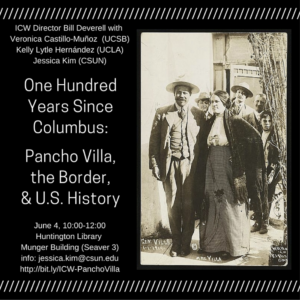
June 4, 2016
Munger Research Center, Seaver Classroom 3, The Huntington
In the spring of 1916 and in the midst of the Mexican Revolution, Pancho Villa crossed the border to attack Columbus, New Mexico. One hundred years after this attack, how have the Mexican Revolution and the border shaped American history?
Join ICW director William Deverell as he discusses a century of borderlands history with Veronica Castillo-Muñoz (UCSB), Kelly Lytle Hernández (UCLA), and Jessica Kim (CSUN).
-
Verónica Castillo-Muñoz is an Associate Professor in the Department of History at the University of California, Santa Barbara. She is an interdisciplinary scholar with training in Gender history, Latin America, and U.S. history. She has written widely on the intersections between gender, family migration, and the U.S.-Mexico borderlands. Her research has been funded by a Fulbright Garcia-Robles Fellowship, an NEH Huntington Library Fellowship, the Hellman Foundation, and the UC President’s Faculty Fellowship in the Humanities.
-
Kelly Lytle Hernández is a professor of History, African American Studies, and Urban Planning at UCLA where she holds The Thomas E. Lifka Endowed Chair in History and is the director of the Ralph J. Bunche Center for African American Studies at UCLA. One of the nation’s leading experts on race, immigration, and mass incarceration, Professor Lytle Hernández is the author of the award-winning books, Migra! A History of the U.S. Border Patrol (University of California Press, 2010), and City of Inmates: Conquest, Rebellion, and the Rise of Human Caging in Los Angeles (University of North Carolina Press, 2017). Currently, Professor Lytle Hernández is completing a new book on the magonista movement, which helped to spark the outbreak of the 1910 Mexican Revolution, and she is the Principal Investigator for Million Dollar Hoods, a university-based, community-drive research project that maps the fiscal and human cost of mass incarceration in Los Angeles. For her leadership of Million Dollar Hoods, Professor Lytle Hernández has won numerous awards, including the 2018 Local Hero Award from KCET/PBS, a 2018 Freedom Now! Award from the Los Angeles Community Action Network, and the 2019 Catalyst Award from the South L.A. parent/student advocacy organization, CADRE. For her historical and contemporary work, Professor Lytle Hernández has been named a MacArthur “Genius” Fellow and a distinguished lecturer for the Organization of American Historians. She is also an elected member of the Society of American Historians and the Pulitzer Prize Board.
-
Jessica Kim received her PhD in history at USC in 2012, was a postdoctoral fellow with ICW in 2013, and is currently Associate Professor of History at CSUN, where she teaches courses on Los Angeles, California, the borderlands, and public history. Her book, Imperial Metropolis: Los Angeles, Mexico, and the Borderlands of American Empire, 1865-1941 (UNC Press, 2019), explores the rise of Los Angeles and investment in Mexico. The book is the co-winner of the 2020 Kenneth Jackson Award for best book from the Urban History Association. She loves combining her interests in public history and the American West on ICW’s social media platforms.
Heavy Ground: William Mulholland and the St. Francis Dam Disaster
ICW In Conversation with D.C. Jackson
May 20, 2016
The Huntington
Dam historian and author Donald C. Jackson and ICW Director William Deverell discuss the 1928 collapse of the St. Francis Dam and Jackson’s book Heavy Ground: William Mulholland and the St. Francis Dam Disaster.
-
Dr. Donald Jackson is currently working as a professor in the Department of Environment Science and Environmental Studies, Lafayette college , USA. His research interests includes Environmental Studies. He /she is serving as an editorial member and reviewer of several international reputed journals. Dr. Donald Jackson is the member of many international affiliations. He/ She has successfully completed his Administrative responsibilities. He /she has authored of many research articles/books related to Environmental Studies.
From Ranchos to Residents: Transforming Southern California, 1850-1950
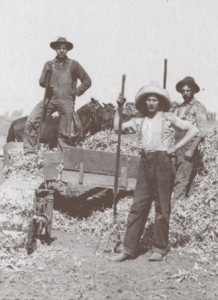
April 23, 2016
Rancho Los Cerritos Historic Site, Long Beach
The discovery of gold brought hundreds of thousands to California, and the transcontinental railroads brought many more. Whether these immigrants sought fortune and adventure or rejuvenation and recuperation, they needed places to live and work. Southern California’s rancheros, who owned much of coastal California in 1850, were faced with the decision of whether to retain or sell off portions of their pasture lands to accommodate the burgeoning population. William Deverell will examine the influences and outcomes of this tremendous shift in land use over time.
-
William F. Deverell received his undergraduate degree from Stanford University in American Studies with honors and distinction. He received his Ph.D. in American History from Princeton University. He is Professor of History at the University of Southern California and Director of the Huntington-USC Institute on California and the West, which was founded in 2004. He also directs the USC Libraries Collections Convergence Initiative. He previously taught at the California Institute of Technology and the University of California, San Diego.
Professor Deverell teaches and writes about the nineteenth and twentieth century American West. He is the author, editor, or co-editor of numerous books exploring a variety of topics and themes. They include The Blackwell Companion to Los Angeles (co-edited with Greg Hise); The Blackwell Companion to California History (co-edited with David Igler); and The Blackwell Companion to the History of the American West. He is the author of Whitewashed Adobe: The Rise of Los Angeles and the Remaking of Its Mexican Past and of Railroad Crossing: Californians and the Railroad, 1850-1910, as well as the recently-published Kathy Fiscus: A Tragedy that Transfixed the Nation. With the historian Tom Sitton, he is the co-editor of Metropolis in the Making: Los Angeles in the 1920s and California Progressivism Revisited. With Greg Hise, he co-authored Eden by Design: The 1930 Olmsted-Bartholomew Plan for the Los Angeles Region and co-edited Land of Sunshine: An Environmental History of Metropolitan Los Angeles. He and Professor Anne Hyde of the University of Oklahoma co-authored the two volume Shaped by the West: A History of North America.
The Fabricated American Desert: Modern and Anti-Modern Conference
April 15-16, 2016
Rothenberg Hall, The Huntington
The southwestern desert has long stood for American individualism, modernist and anti-modernist sentiments, and social and political experiments. As such it has attracted artistic and architectural movements that give form to these ideas. This conference brings together scholars from diverse disciplines to explore the relationship between desert extremes and the built environment.
_________________________________________________________________________
Importance of Historical Literacy: What Good Is History?
March 25, 2016
Haaga Hall, The Huntington
This event at The Huntington Library, a research institution close to the hearts and minds of both of our guests, will feature Alan Taylor and Elizabeth “Lil” Fenn in conversation with one another moderated by ICW Director William Deverell. Why do they do what they do? How does their present influence their perceptions of the past, and, more important, how do they imagine their analyses of the past can be of use to their students, their peers, and all of us in our complex and often troubled world of today? What good, after all, is history?
As part of a national celebration of the 100th anniversary of the Pulitzer Prize, California Humanities will convene a series of discussion forums throughout the state as part of the Pulitzer Prizes Centennial Campfires Initiative. Aimed at deepening the public’s engagement with contemporary issues through a humanities lens, On the Road with California Humanities will connect Pulitzer-prize winning authors, artists, journalists, and other notable thinkers who are helping to guide California along the road to a vibrant future.
The first in the series will feature a conversation on the need for historical perspective in our times and is presented in partnership with California Humanities, The Huntington Library and Huntington-USC Institute on California and the West.
-
Alan Taylor attended Colby College, graduating in 1977. After serving as a researcher for historic preservation in the United States Virgin Islands (1977-79), he pursued graduate study at Brandeis University, receiving his Ph.d in American History in 1986. After a postdoctoral fellowship at the Institute of Early American History and Culture (Williamsburg, Virginia), he taught in the history department at Boston University from 1987 to 1994. Since 1994, he has been a professor at the University of California at Davis, where he teaches courses in early North American history, the history of the American West, and the history of Canada. In August 2014, he will begin to hold the Thomas Jefferson Chair in American History at the University of Virginia.
He is also active in California State Social Science and History Project. This project provides curriculum support for K-12 teachers in history and social studies. In 2002 he won the University of California at Davis Award for Teaching and Scholarly Achievement and the Phi Beta Kappa, Northern California Association, Teaching Excellence Award.
-
Elizabeth Fenn is the author of Encounters at the Heart of the World: A History of the Mandan People, the winner of the Pulitzer Prize in History. Published by Hill and Wang, it tells the story of the spectacular rise and equally spectacular collapse of the Mandan Indians in the first century after European contact.
Lil’s first book, Pox Americana: The Great Smallpox Epidemic of 1775-82, was also published by Hill and Wang. It unearthed the devastating effects of a terrible smallpox epidemic that coursed across the North American continent during the years of the American Revolution. Pox Americana was awarded three prizes, including the 2002 James J. Broussard First Book Prize (Society for Historians of the Early Republic), the 2003 Longman-History Today Book of the Year award, and the 2004 Society of the Cincinnati Book Prize.
She is professor of history at the University of Colorado, Boulder, where she studies the early American West, focusing on epidemic disease, Native American, and environmental history.
She is currently at work on an expansive biography of Sacagawea that uses her life story to illuminate a wider history of the northern plains and Rockies.
Indigenous Borderlands in the Formation of the Early American West
ICW In Conversation with Natale Zappia
March 3, 2016
The Huntington
Natale Zappia joins ICW Director William Deverell to talk about his book Indigenous Borderlands in the Formation of the Early American West.
This conversation is part of a brown bag luncheon series sponsored by ICW.
-
Natale Zappia is an assistant professor of history at Whittier College specializing in the environmental history of the early America. His work explores the intersection of continental trading networks, food pathways, and ecological transformations across the West. His recent book, Traders and Raiders: The Indigenous World of the Colorado Basin (UNC Press, 2014), tells the history the early American Lower Colorado River, a watershed that looms large over the modern urban landscapes of Los Angeles and other western cities. Zappia is now at work on a new book project, “Food Frontiers: Borderland Ecologies in Early America,” which explores the evolution of food systems in early North America. Zappia is also the Associate Project Director of the Early California Cultural Atlas, a digital atlas mapping Indigenous migration across California between 1769-1848.
Woody Guthrie LA: 1937-1941 at the GRAMMY Museum
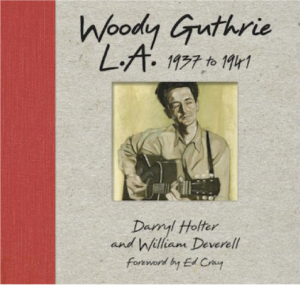
March 1, 2016
GRAMMY Museum
A Conversation With Authors William Deverell and Darryl Holter in conjunction with the recent release of their new co-authored book, Woody Guthrie L.A. 1937 to 1941, historians William Deverell and Darryl Holter will join GRAMMY Museum Executive Director Bob Santelli for a conversation surrounding the book and the legacy of one of the most iconic and influential songwriters of the 20th century, Woody Guthrie. Released by Angel City Press on Jan. 15, 2016, Woody Guthrie L.A. 1937 to 1941 details Guthrie’s time in Los Angeles, providing readers with a window into his early radio success, first recordings, involvement in leftist politics, racial education, and the impact he still exerts in his songs about migrants and workers looking for the main chance in California. The conversation will be followed by a special performance from Holter, whose 2015 album Radio Songs: Woody Guthrie in Los Angeles, 1937–1941 was released to critical acclaim.
___________________________________________________________________
“The Problem of Homicide in Los Angeles County, 1840-1874”
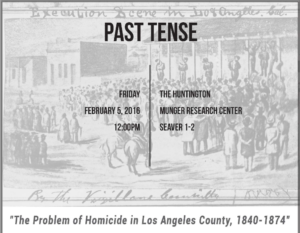
February 5, 2016
Munger Research Center, Seaver Classrooms, The Huntington
John Mack Faragher, Howard R. Lamar Professor of History & American Studies and Director of Howard R. Lamar Center at Yale University leads the round-table discussion for this seminar event.
The Past Tense Seminar Series is co-sponsored by the USC-Huntington Early Modern Studies Institute, the Huntington-USC Institute for California and the West, and The Huntington Library.
-
John Mack Faragher was born in Phoenix, Arizona and raised in southern California, where he attended the University of California, Riverside (B.A., 1967), and did social work, before arriving at Yale (Ph.D., 1977). His books include Women and Men on the Overland Trail(1979); Sugar Creek: Life on the Illinois Prairie (1986); Daniel Boone: The Life and Legend of an American Pioneer (1992); The American West: A New Interpretive History (2000), with Robert V. Hine; A Great and Noble Scheme: The Tragic Story of the Expulsion of the French Acadians from their American Homeland (2005); and Frontiers: A Short History of the American West (2007), with Robert V. Hine. He teaches the history of the American West and directs the Howard R. Lamar Center for the Study of Frontiers and Borders.
Exhibition: “Forgotten Founders: The Hidden African Ancestry of L.A.”
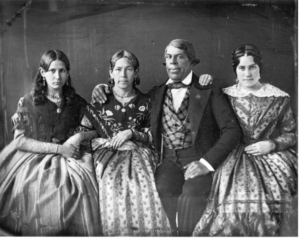
February 4-29, 2016
El Pueblo’s Pico House
ICW Visiting Associate Director Jessica Kim worked with her CSUN Public History students to research and bring the exhibition “Forgotten Founders: The Hidden African Ancestry of Los Angeles” to El Pueblo’s Pico House.
This collaborative exhibit will trace the role of individuals of African descent in the founding of Los Angeles. While emphasizing the diverse racial, ethnic, and cultural backgrounds of the forty-four pobladores who founded the pueblo on the edge of the Los Angeles River in 1781, the exhibit will also trace the connections between this specific event and the broader history of communities of African descent in Mexico and the American West.
Read the article in the San Gabriel Valley Tribune.
This exhibit is brought to you in part by California State University, Northridge Public History Program. This project takes CSUN Public History students out of the classroom, away from traditional textbooks, and into the rich world of public history. More specifically, students have the unique opportunity to practice “hands-on” history through researching and curating a historical exhibit for a public audience.
The exhibit is also presented in conjunction with the National Parks Conservation Association, the Western National Parks Association, and the Huntington-USC Institute on California and the West.
-
Jessica Kim received her PhD in history at USC in 2012, was a postdoctoral fellow with ICW in 2013, and is currently Associate Professor of History at CSUN, where she teaches courses on Los Angeles, California, the borderlands, and public history. Her book, Imperial Metropolis: Los Angeles, Mexico, and the Borderlands of American Empire, 1865-1941 (UNC Press, 2019), explores the rise of Los Angeles and investment in Mexico. The book is the co-winner of the 2020 Kenneth Jackson Award for best book from the Urban History Association. She loves combining her interests in public history and the American West on ICW’s social media platforms.
DigitaLA
January 30, 2016
The Huntington
Come explore the digital landscapes of LA’s storied past!
In the past five years, Angelenos have enjoyed a flowering of new and exiting digital projects highlighting their city’s rich history. From popular Twitter feeds to original YouTube series to digitized archives, Los Angeles history has found its place in the digital California sun. Drawing together practitioners from across Los Angeles and the Internet, this event will highlight some of the most exciting digital projects dedicated to the city’s past.
Organized by Jessica Kim, Visiting Associate Director, Huntington-USC Institute on California and the West
-
Genevieve Carpio is an Associate Professor in the César E. Chávez Department of Chicana/o Studies. Her research and teaching interests include relational studies of race, 20th century U.S. history, (sub)urban history, and spatial theory, particularly as it relates to notions of place and mobility. She has a long-standing interest in the public and digital humanities, particularly as it relates to the California Inland Empire, where she was raised. She is the author of a book on spatial mobility, both permission to move freely and prohibitions on movement, and racial formation in the multiracial suburbs of Los Angeles and the Inland Empire entitled Collisions at the Crossroads: How Place and Mobility Make Race (University of California Press, 2019). She has also published in American Quarterly, Journal of American History, Journal of Urban Affairs, Western Historical Quarterly, Casden Annual Review, the Arcadia local history series, and Information, Communication and Society, among other venues. She currently serves on the editorial board of Geohumanities, a journal of the American Association of Geographers, and as a reviewer for several academic journals. Before joining UCLA, Professor Carpio was a Postdoctoral Fellow in the Department of History and the Program for Ethnicity, Race, and Migration at Yale University. Carpio received a B.A. in Anthropology at Pomona College and went on to earn an M.A. in Urban Planning at the University of California, Los Angeles. She completed her doctorate in the Department of American Studies and Ethnicity at the University of Southern California. Professor Carpio is the recipient of two Ford Foundation Fellowships, the Hellman Fellowship, and the UCLA Faculty Career Development Award. She has also received a USC Provost Fellowship and recognition as PAGE Fellow by Imagining America, a consortium of universities dedicated to public engagement.
-
Nathan Masters is host and executive producer of Lost L.A., an Emmy Award-winning public television series from KCET and the USC Libraries. The show explores how rare artifacts from Southern California’s archives can unlock hidden and often-surprising stories from the region’s past. Nathan’s writing has appeared in many publications, including Los Angeles Magazine and the Los Angeles Times. He also helps manage public programs and media initiatives at the USC Libraries, home to the L.A. as Subject research consortium.
-
Victoria Bernal is a cultural anthropologist whose scholarship in political anthropology contributes to media and IT studies, gender studies, and African studies. Her work addresses questions relating to politics, gender, migration and diaspora, war, globalization, transnationalism, civil society and activism, development, digital media, and Islam. Dr. Bernal’s research is particularly concerned with relations of power and inequality and the dynamic struggles of ordinary people as they confront the cruel and absurd contradictions arising from the concentration of wealth and political power locally and globally. She has carried out ethnographic research in Sudan, Tanzania, Eritrea, Silicon Valley and cyberspace. Her articles and chapters have appeared in various collections as well as in anthropological, African Studies, and interdisciplinary journals, including American Ethnologist, Cultural Anthropology, American Anthropologist, Global Networks, Comparative Studies in Society and History, African Studies Review, and Political and Legal Anthropology Review. Selected publications are available below. Bernal teaches courses on Digital Media and Culture, Global Africa, Nations, States and Gender, and the Politics of Protest among others.
Professor Bernal’s current project on “Privacy, Security, and Surveillance: Struggles on the Digital Frontiers of Democracy” was supported by a Fellowship from the Center for Advanced Study in the Behavioral Sciences at Stanford University for the 2015-16 academic year. The project explores shifting American cultural understandings and practices around digital surveillance and cybersecurity with a particular focus on: 1) tech culture and technological responses to surveillance; 2) mainstream media and expert discourses on cybersecurity and threats; and 3) public culture and artistic representations addressing surveillance, threats, and digital technologies.
-
Dr. Axelrod is Adjunct Professor of History, Art History, Urban & Environmental Studies, and Cultural Studies at Occidental College, as well as founding director of the Institute for the Study of Los Angeles. Before arriving at Occidental in 2005, he taught several years in the Film Studies and History Departments at UC Irvine and served as Kevin Starr Fellow in California Studies at the University of California Humanities Research Institute. He received his Ph.D. in American History (with graduate certificates in Critical Theory, Feminist Studies, and Film Studies) from the University of California, Irvine, in 2001 after having graduated cum laude from Williams College in 1992, where he majored in History, Political Science (with Highest Honors), and Women’s Studies.
Professor Axelrod is the author of Inventing Autopia: Envisioning the Modern Metropolis in Jazz Age Los Angeles, published by the University of California Press in 2009, as well as several articles and book chapters. His research generally probes the connections between visuality, urban topography, memory, gender, race, and transportation in twentieth century urban environments, with an emphasis on Southern California. He has presented more than sixty formal papers at academic and public policy conferences around the world and is a board member of the Historical Society of Southern California, the Lummis Day Community Foundation, and the National Trust for Historic Preservation’s Executive Committee for the Historic Southwest Museum Site. Born in Hollywood, “Jem” Axelrod grew up primarily in Riverside, California, and now lives with his wife, Lil Gomez Delcampo, and their twin daughters, Amalia and Sophie, in Pasadena.
-
Tom Carroll is a content creator for 404 by L.A. Times. Before joining The Times in 2022, he created, produced and hosted the web series Tom Explores Los Angeles. He has produced stories for NPR and Gimlet. His documentary, Charlie’s Lot, won Best Short Doc at the 2020 Arizona International Film. A fourth-generation Southern Californian, he is a graduate of Occidental College and the University of Southern California.
KPCC’s AirTalk
January 14, 2016
Darryl Holter and William Deverell discuss Woody Guthrie’s time in Los Angeles with Larry Mantle on KPCC’s AirTalk.
___________________________________________________________________
KCRW’s Morning Edition
January 2016
William Deverell is interviewed by KCRW’s Morning Edition about California’s role in the Civil War.